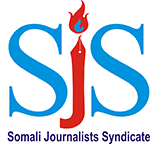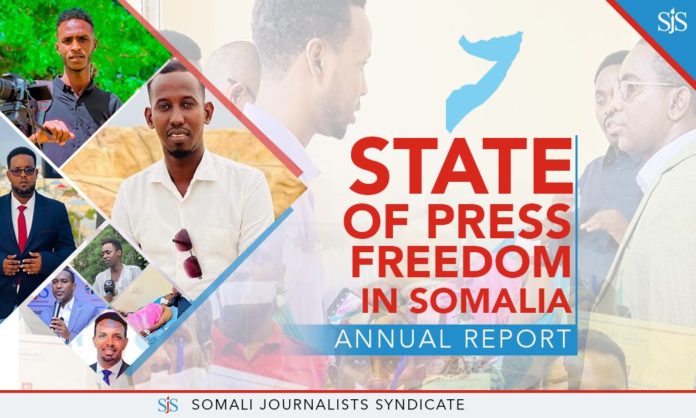MOGADISHU, Somalia 31 January 2023 – Somalia is regarded as one of the most dangerous countries in the world for journalists, as they face threats from both government and militant groups like Al-Shabab and a few clan militias. The country has topped the list of the Committee to Protect Journalists’ Global Impunity Index for the eighth consecutive year making it the most dangerous country for journalists in Africa.
Much worse than the previous years, judicial harassment on journalists and union leaders, threats through orders and directives that curtail press freedom and impose the journalists and the media houses to remain under self-censorship fearing government reprisals has become the norm in 2022 and in this way, many stories with public interest went unreported.
The new directive imposed on the media on October 8, 2022 by the Somali ministry of information contains a blanket restriction on media freedom and journalists’ right to access information. Journalists and media houses are concerned that the vague wording in the law would limit their ability to report freely on ongoing operations against any armed groups and restrict their media freedoms.
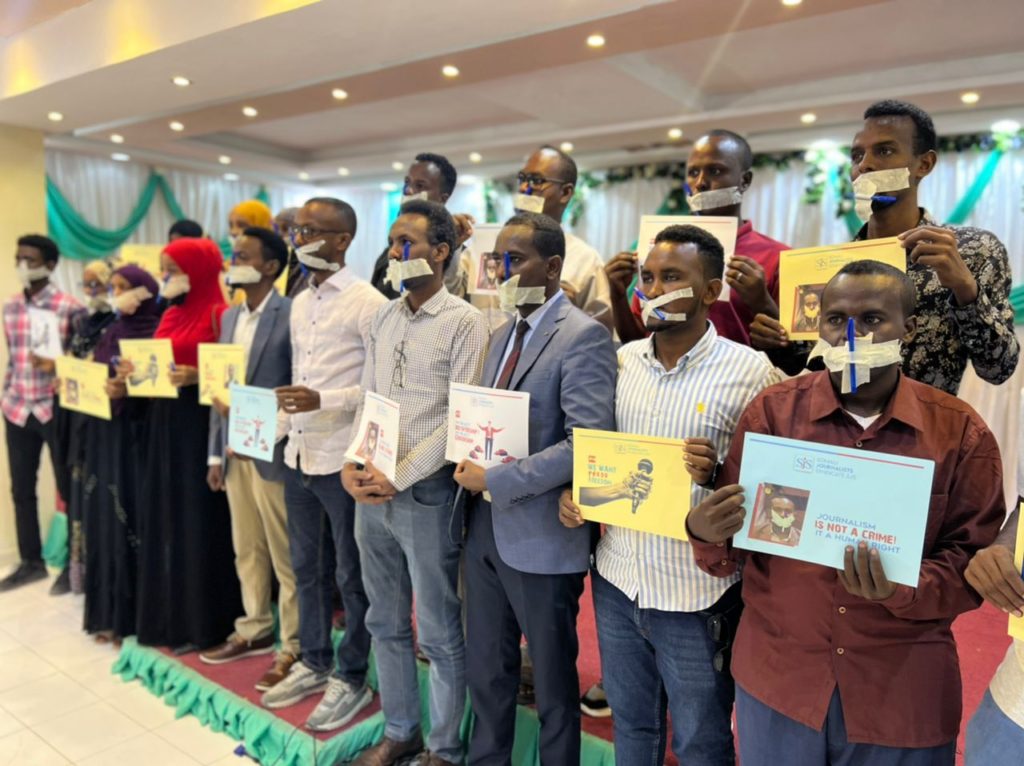
The raid on SJS office on October 10, the detention of SJS secretary-general Abdalle Ahmed Mumin on October 11 and the persecution against him are yet another chilling message to all the media fraternity in the country. The raid on SJS office was carried by masked men armed with AK47 rifles led by the commander of the Somali Intelligence and Security Agency (NISA)’s Howlwadag district Mr. Shakib shortly after SJS among four press freedom organization held a joint press conference raising concerns on the ministry of information’s restrictive directive.
Following the October 8 directive, Jubbaland intelligence officers arbitrarily detained Horn Cable TV journalist and SJS press freedom coordinator, Abdullahi Hussein Kilas, in the port city of Kismayo on October 23, after covering an attack on a hotel in the centre of Kismayo that day. Kilas was freed later in the day after authorities forced Horn Cable TV to remove the his news report. Consequently, authorities in Hirshabelle raided Hiiraanweyn radio in Beledweyne and detained four reporters on December 22, for reporting the withdrawal of Ma’awisley militia from villages in Hiiraan region over lack of payment. Galmudug police in Adado also detained two local journalists after interviewing clan elders who allegedly met with al-Shabaab members on December 25. Local journalists were also informed to refrain from reporting security related incidents including al-Shabaab attacks.
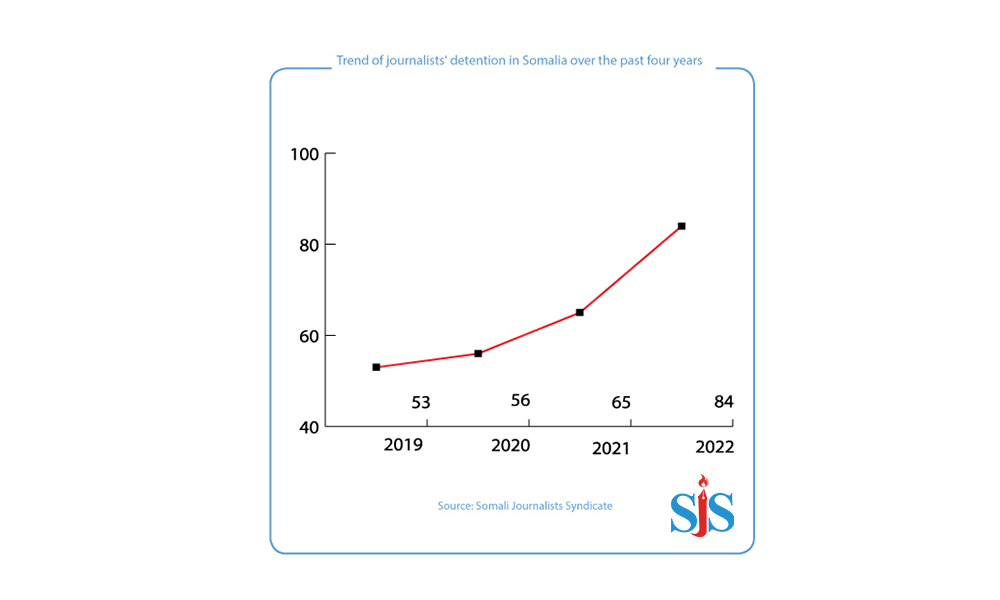
According to SJS documentation, arbitrary detention, use of threats, restrictions and blocking access to information has reached to another worrisome level throughout 2022 and on the other hand federal and local authorities have doubled their attacks on journalists covering the government-declared war between government forces and al-Shabaab in certain regions of the country. Subsequently, two prominent journalists were killed while ten others were injured in 2022, 84 journalists were arrested, seven media stations/offices were raided and shuttered due to their critical reporting.
SJS has documented a sharp rise of the number of journalists leaving the country as a result of threats related to their reporting. Over 10 journalists (three of them female reporters) have fled the country to different countries including Turkey and Kenya. These journalists said they decided to flee into exile as the pressure and threats from the authorities grew and crackdown on the free press has made the situation untenable.
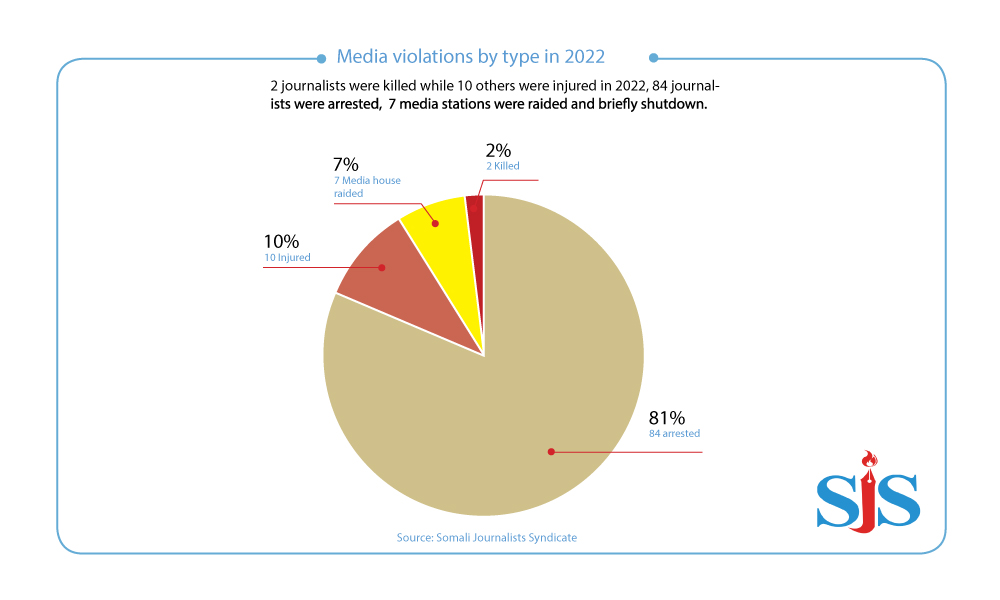
Restrictions on access to information entrenched self-censorship among the media. Journalists in Mogadishu, Hirshabelle, Galmudug, South West and Jubbaland told SJS that they were blocked from major events and to the scenes of incidents, including sites of Al-Shabaab attacks and denied access to information on public interests. Journalists have particularly narrated acts of censorship and intimidation aimed at stopping them from uncovering serious human rights violations.
Police commanders, judges, government officials, clan leaders and members of al-Shabaab were described as the key perpetrators of these violations. Journalists in Puntland told SJS that they were denied access to cover news reports revealing police wrongdoings and sexual violence against women and girls. Authorities in Somaliland have used severe restrictions on access to information including internet outage, detention of journalists, suspension of media houses as well as threats intended to silence critical coverage by the local journalists.
Journalists, particularly those covering human rights, have described about economic hardships as a direct consequence of their work to document and investigate human rights violations. The hostile attitude towards journalists covering human rights abuses and the lack of awareness for the general public also remain as part of the challenge.
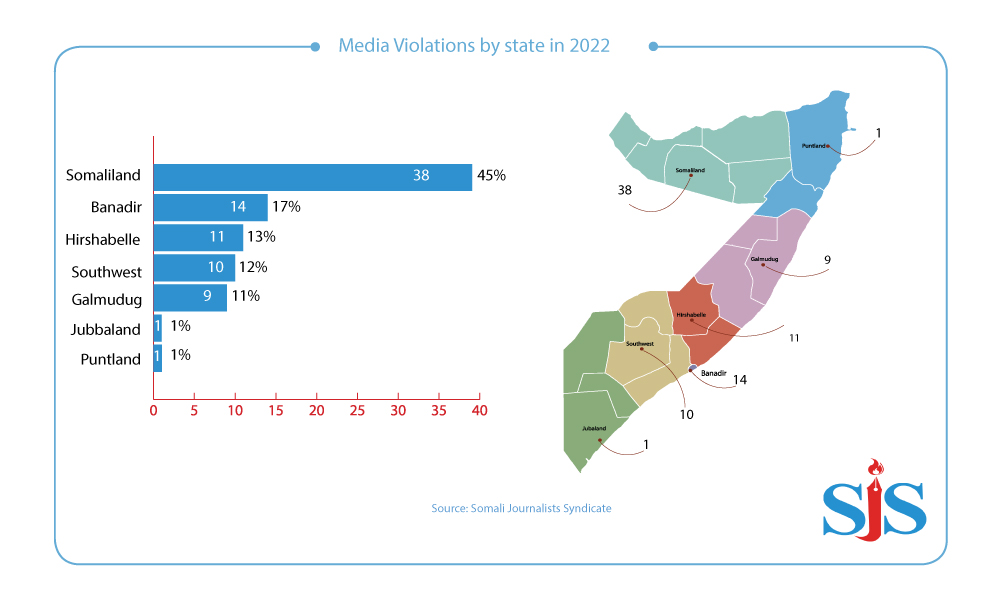
Universal access to information means that everyone has the right to seek, receive and impart information. The media plays a vital role, particularly when it aims to inform the public of critical information and monitors government actions. The right to universal access to information is also bound up with the right to freedom of the press. Unfortunately, the Federal Government of Somalia and its member states are yet to introduce the Access to Information Bill which is a constitutional requirement under Article 32 of the Provisional Federal Constitution.
The growing pressure against Somali journalists and lack of access to information call for concern. When journalists are blocked, threatened and their access to information denied, it will entrench a culture of impunity. Providing and presenting information to the general public, particularly on human rights violations promotes redress for the victims or to seek justice regarding perpetrators through legal action.
We are alarmed by the rise of the attacks against the journalists who are solely targeted for their reporting on the pretext of the Somali government’s military offensive against al-Shabaab. Sadly, these attacks on free press were motivated by the 8 October directive by the ministry of information restricting media coverage on the ongoing security operations.
While we condemn all kinds of attacks on the journalists in the strongest terms possible, we also reiterate our call for both the federal government and the federal member states to stop attacks against journalists and allow the independent media and their journalists to carry out their duties without threats and detention.
In addition, the Somali media law (amendment 2020) also includes provisions that threaten human rights, including freedom of expression, media freedom and could criminalize reporting and give the government overly broad powers and oversight over media organizations.
The provisions on criminal penalties are vaguely worded and could give law enforcement authorities wide scope for misinterpretation and abuse. These include the provision prohibiting reporting on issues conflicting with “national interest”, “false information”, “incitement to violence and clannism” and “dissemination of propaganda”.
Furthermore, the law imposes unspecified fines on journalists who contravene its provisions, and journalists could face prosecution for failure to pay the fines. It also includes a provision which risks undermining journalists’ rights to confidential sources and also contains administrative restrictions that give the Ministry of Information a broad mandate to regulate the media and media practitioners.
It’s unfortunate that journalists are now fearful in their country and are resorting to either self-censor or leave the country. We urge for the local and federal authorities to end the restriction to access to information by state and non-state actors in Somalia.
The federal government and the federal member states should create a safe environment where journalists can exercise their profession without fear or reprisals and allow review for the media law with the consultation of the media stakeholders, media associations and journalists groups.
The federal government and the regional states – including Somaliland – should stop using the penal code for journalists and promptly finalize a comprehensive review of this outdated code and all other laws that impede the right to freedom of expression and media freedom, in addition to other rights, and bring them in line with Somalia’s constitution and international human rights law and standards.
Mohamed Ibrahim Isak
President, Somali Journalists Syndicate (SJS)
DOWNLOAD FULL REPORT (English)
READ SOMALI VERSION (Somali)
